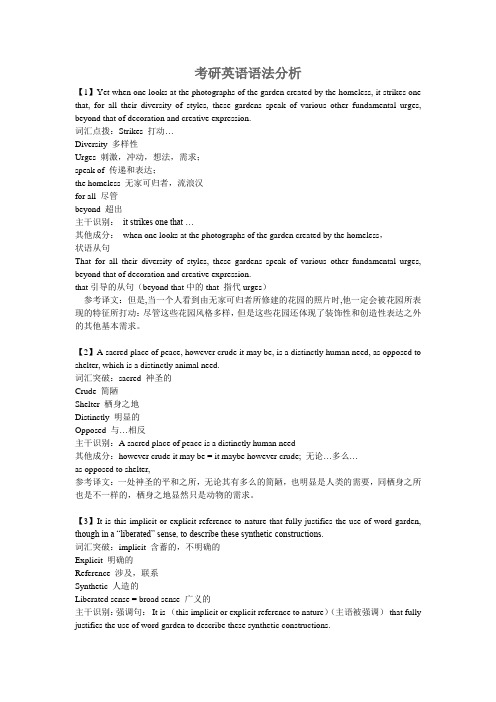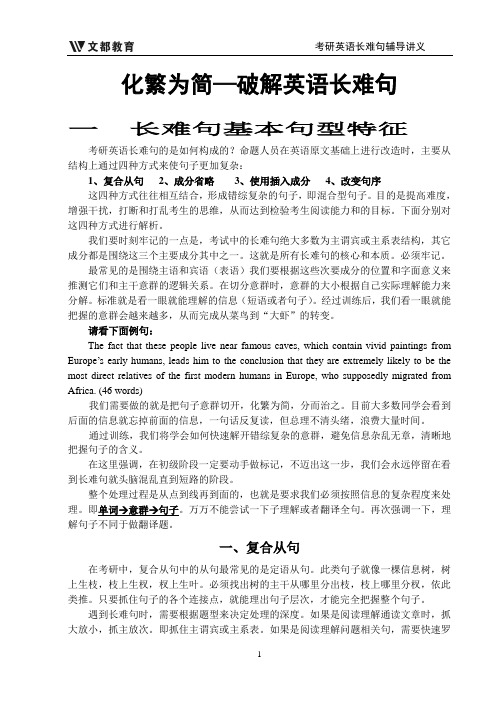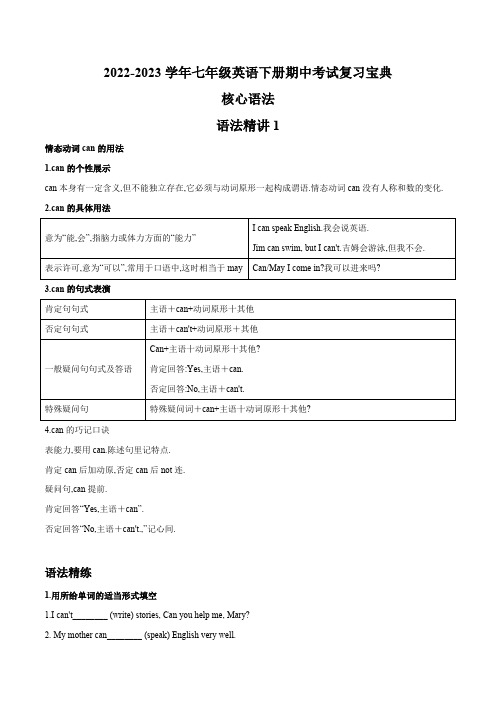考研英语语法精讲讲义——屠皓民
语法基础班讲义(1)

语法基础班讲义(1)主讲:王国清副教授简介:资深考研英语命题研究专家,考研、四六级辅导专家,英语翻译专业硕士,新西兰惠灵顿大学国际经济学博士,多次参加考研及四、六级阅卷工作,全国二十多个省市特邀全程主讲名师,MBA、MPA教育中心首席主讲,2008年北京奥运会赛后新闻发布会同声传译,并从事雅思、托福等多种培训权威指导,培训的学员达数几十万之多,授课效果立竿见影、专业性强、重点突出、激情幽默,著有《考研语法重难点精解》、《考研红宝书英语写作—(图画+话题)180篇》、《考研英语最后五套题》、《考研英语正红版最后两套题》、《考研英语正红版写作重点30篇》、《大学英语四、六级写作宝典》、《大学英语四、六级阅读方法概要》、《大学英语四、六级经典语法指南》等30多部丛书,堪称英语界“语法权威”,翻译界“金牌同传”。
语法,无论是对于英语学习者还是教授者而言,都是最难掌握的问题,而掌握扎实的语法无疑是学好英语的关键,尽管在研究生英语考试中并不直接涉及语法,但阅读理解,写作和翻译等试题无不体现出它的重要性。
然而,市场上种类繁多的语法书籍,大都是内容多而不精,即次重点不分,并且对于在学习过程中,大家共同反映的较有难度的语法,如非谓语动词、虚拟语气、定语从句都未能作出精辟分析,使读者看后仍不知所云。
本着这个目的,我们再次相聚考研讲堂,希望通过两天的深入学习使广大考生对语法有个彻底的了解,在今后考试中遇到相应问题能游刃有余。
一、语法知识回顾(一)基础语法知识1.英语句子的基本句型(Basic Sentence Pattern)(1)主+系+表(SVP)(2)主+谓(不及物动词)(SV)(3)主+谓(及物动词)+宾(SVO)(4)主+谓(及物动词)+间接宾语(指人)+直接宾语(指物)(SVOO)(5)主+谓(及物动词)+宾+补足语(SVOC)2.按照用途句子的分类(1)陈述句(Declarative Sentence)(2)疑问句(Interrogative Sentence)①一般疑问句(General Question)②特殊疑问句(Special Question)③选择疑问句(Alternative Question)④反意疑问句(Tag Question)(详见“考研英语语法重难点精解”中的反意疑问句)(3)祈使句(Imperative Sentence)(4)感叹句(Exclamatory Sentence)3.按照结构句子分类(Division by Structure)(1)简单句(Simple Sentence)只有一个主语(或并列主语)和一个谓语(或并列谓语)构成的句子称为简单句:(2)并列句(Compound Sentence)用并列连词(或分号、冒号、逗号)把两个或两个以上的简单句连在一起构成的句子叫并列句(3)复合句(Complex Sentence)由关联词把一个主句和一个或一个以上的从句联系在一起所构成的句子称为复合句,也称为主从复合句,复合句根据关联词在句中的作用可分为如下类型:①名词性从句(Noun Clause)(主语从句、宾语从句、表语从句、同位语从句)②状语从句(Adverbial Clause)(详见“考研英语语法重难点精解”中状语从句)(二)重点语法回顾1、主谓一致(Subject-verb Agreement)一致是指句子成份间或词语间必须在人称、数、性等方面保持一致关系,一致这一语言现象在日常应用及各类英语考试中出现较多,最主要的一致关系是主谓一致。
22_考研英语语法分析20131129

考研英语语法分析【1】Yet when one looks at the photographs of the garden created by the homeless, it strikes one that, for all their diversity of styles, these gardens speak of various other fundamental urges, beyond that of decoration and creative expression.词汇点拨:Strikes 打动…Diversity 多样性Urges 刺激,冲动,想法,需求;speak of 传递和表达;the homeless 无家可归者,流浪汉for all 尽管beyond 超出主干识别:it strikes one that …其他成分:when one looks at the photographs of the garden created by the homeless,状语从句That for all their diversity of styles, these gardens speak of various other fundamental urges, beyond that of decoration and creative expression.that引导的从句(beyond that中的that 指代urges)参考译文:但是,当一个人看到由无家可归者所修建的花园的照片时,他一定会被花园所表现的特征所打动:尽管这些花园风格多样,但是这些花园还体现了装饰性和创造性表达之外的其他基本需求。
【2】A sacred place of peace, however crude it may be, is a distinctly human need, as opposed to shelter, which is a distinctly animal need.词汇突破:sacred 神圣的Crude 简陋Shelter 栖身之地Distinctly 明显的Opposed 与…相反主干识别:A sacred place of peace is a distinctly human need其他成分:however crude it may be = it maybe however crude; 无论…多么…as opposed to shelter,参考译文:一处神圣的平和之所,无论其有多么的简陋,也明显是人类的需要,同栖身之所也是不一样的,栖身之地显然只是动物的需求。
大学英语语法PPT(全)

3/4/2023
1、名词(n.): 表示人、事物、地点或抽象概念的名称。如:boy, morning, bag, ball, class, orange.
----《不列颠英语用法大全》
3/4/2023
“语言的科学和艺术” -----英国著名语言学
H.Sweet
3/4/2023
两个目标、三个阶段:
高级阶段
过渡阶段
能
初级阶段
练知↑
由此看出学习语法知识是第一步,通过不断的练习才能实现向语言能力的转 换,最终达到言语交际的目的。
3/4/2023
外语语法学习示意图: 高级阶段 过渡阶段 初级阶段
second, third, fourth. 5、动词(v.): 表示动作或状态。如:am, is,are,have,see . 6、副词(adv.): 修饰动词、形容词或其他副词,说明时间、地点、程度等。如:
now, very, here, often, quietly, slowly. 7、冠词(art..):用在名词前,帮助说明名词。如:a, an, the. 8、介词(prep.): 表示它后面的名词或代词与其他句子成分的关系。如in,
daughter out?
3/4/2023
这位父亲问他女儿的男朋友(其正准 备开车带他女儿出门):Do you drink?他真正的意思是问这个年轻男子 是否有饮酒的习惯,即在询问情况, 而不是问他现在想不想喝酒,即不是 在提议。
3/4/2023
考研英语长难句讲义-唐启明

化繁为简—破解英语长难句一长难句基本句型特征考研英语长难句的是如何构成的?命题人员在英语原文基础上进行改造时,主要从结构上通过四种方式来使句子更加复杂:1、复合从句2、成分省略3、使用插入成分4、改变句序这四种方式往往相互结合,形成错综复杂的句子,即混合型句子。
目的是提高难度,增强干扰,打断和打乱考生的思维,从而达到检验考生阅读能力和的目标。
下面分别对这四种方式进行解析。
我们要时刻牢记的一点是,考试中的长难句绝大多数为主谓宾或主系表结构,其它成分都是围绕这三个主要成分其中之一。
这就是所有长难句的核心和本质。
必须牢记。
最常见的是围绕主语和宾语(表语)我们要根据这些次要成分的位置和字面意义来推测它们和主干意群的逻辑关系。
在切分意群时,意群的大小根据自己实际理解能力来分解。
标准就是看一眼就能理解的信息(短语或者句子)。
经过训练后,我们看一眼就能把握的意群会越来越多,从而完成从菜鸟到“大虾”的转变。
请看下面例句:The fact that these people live near famous caves, which contain vivid paintings from Europe‟s early humans, leads him to the conclusion that they are extremely likely to be the most direct relatives of the first modern humans in Europe, who supposedly migrated from Africa. (46 words)我们需要做的就是把句子意群切开,化繁为简,分而治之。
目前大多数同学会看到后面的信息就忘掉前面的信息,一句话反复读,但总理不清头绪,浪费大量时间。
通过训练,我们将学会如何快速解开错综复杂的意群,避免信息杂乱无章,清晰地把握句子的含义。
在这里强调,在初级阶段一定要动手做标记,不迈出这一步,我们会永远停留在看到长难句就头脑混乱直到短路的阶段。
专题06语法精讲精练(教师版)七年级下册期中考试复习宝典(人教版)含答案

2022-2023学年七年级英语下册期中考试复习宝典核心语法语法精讲1情态动词can的用法1.can的个性展示can本身有一定含义,但不能独立存在,它必须与动词原形一起构成谓语.情态动词can没有人称和数的变化.2.can的具体用法意为“能,会”,指脑力或体力方面的“能力”I can speak English.我会说英语.Jim can swim, but I can't.吉姆会游泳,但我不会.表示许可,意为“可以”,常用于口语中,这时相当于may Can/May I come in?我可以进来吗?3.can的句式表演肯定句句式主语+can+动词原形十其他否定句句式主语+can't+动词原形+其他一般疑问句句式及答语Can+主语十动词原形十其他?肯定回答:Yes,主语+can.否定回答:No,主语+can't.特殊疑问句特殊疑问词+can+主语十动词原形十其他?4.can的巧记口诀表能力,要用can.陈述句里记特点.肯定can后加动原,否定can后not连.疑问句,can提前.肯定回答“Yes,主语+can”.否定回答“No,主语+can't.,”记心间.语法精练1.用所给单词的适当形式填空1.I can't________ (write) stories, Can you help me, Mary?2. My mother can________ (speak) English very well.3.What can your brother________ (do)?4.Miss Lin can't play the piano, but she can________ (sing)well.5.Little Tom can draw, but he________ (can not) dance.答案:1.1.write2.speak3.do4.sing5.can'tII.单项选择1.(2022·百色中考)- ________ you tell us a story in English?-I think I can do it. Let me try.A. NeedB. CanC. ShouldD. Must2.(2022·北京中考)- ________ I take photos here?-Sorry, you can't. It's not allowed in the museum.A. MustB. NeedC. CanD. Will3.We should learn some basic life skills since we________ depend on our parents some day.A. canB. can'tC. mustD. mustn't4. -What kind of music do you like?-I like music that I________ dance to.A. canB. mustC. shouldD. need5.(2022·成都中考)-There is a new art museum in our city. You________ miss it.-Thank you. I won't.A. can'tB. mustC. needn't答案:1.B 考查情态动词辨析.句意:-你能用英语给我们讲一个故事吗?-我认为我能.让我试试.need需要;can能; should应当;must必须.故选B.2.C 考查情态动词辨析.句意:-我能在这里拍照吗?-抱歉,你不能.博物馆不允许拍照.must必须;need需要;can能;will将.故选C.3.B 考查情态动词辨析.句意:既然我们有一天不能依靠父母,我们就应当学会一些基本的生活技能.can 能;can't不能;must必须;mustn't不应该.故选B.4.A 考查情态动词辨析.句意:-你喜欢哪种音乐?-我喜欢能伴着跳舞的音乐.can能;must 必须;should应当;need需要.故选A.5.A 考查情态动词辨析.句意:-我们城市有一个新的艺术博物馆.你不能错过它.-谢谢.我不会的.can't 不能;must 必须;needn't 不必.故选A.III.按要求改写句子(每空一词)1.My father can speak English well.(改为一般疑问句)________ your father________ English well?2.Tom can ride a horse.(改为否定句)Tom________ ________ a horse.3.Mr.Green can do Chinese kung fu.(对画线部分提问)________ ________ Mr. Green________?4.Can Tom and Jim draw pictures?(作肯定回答)Yes, ________ ________.5.play,can,Cindy,well,the,guitar(连词成句)___________________________________________________________________________________________?答案:1.Can;speak2. can't ride3.What can; do4.they can5.Can Cindy play the guitar well语法精讲2一、频度副词定义用来表示频率的副词,叫频度副词.常见的频度副词有:always, usually, often, sometimes, never 等通常在be 动词、助动词或情态动词之后He is always busy.他总是很忙.I will never forget you.我永远也不会忘记你.通常位于实义动词之前They often go swimming.他们经常去游泳.频度副词在句中的位置sometimes 可放在句首、句中或句尾Sometimes she watches TV.她有时看电视.提问how often 意为“多久一次”-How often do you drink milk?-你多久喝一次牛奶?-Every day.-每天.二、一般现在时定义表达现在的状态,主语的性格、能力以及经常或习惯性的动作等He usually takes the bus to school.主语是第三人称单数时,谓语动词用第三人称单数形式他通常乘坐公交车去上学.动词形They watch TV every day.态变化主语不是第三人称单数,谓语动词用原形他们每天都看电视.三、句式结构肯定句句式主语+be/行为动词+其他主语+be+ not+其他否定句句式主语+don't/doesn't+动词原形+其他句式结构Be+主语+其他?一般疑问句句式Do/Does+主语十动词原形十其他?语法精练1.用所给单词的适当形式填空1.Mary usually________ (go) shopping with her mother on Sunday.2. ________ (do)Peter________ (take)a shower in the evening or in the morning?3.Lisa________ (not do) her homework in the evening.4.She never________ (eat) hamburgers for lunch.5.-What time Jack________ (go) to bed?-At 10:30 p.m.答案:1.goes2.Does;take3.doesn't do4.eats5.does;goII.按要求改写句子(每空一词)1.Mr. Green usually goes to work at seven o'clock.(改为一般疑问句)________ Mr. Green usually________ to work at seven o'clock?2.Anna always plays volleyball after school.(改为否定句)Anna________ plays volleyball after school.3.I do my homework at home on weekends.(改为否定句)I________ ________ my homework at home on weekends.4.Lisa sometimes eats bread for breakfast.(对画线部分提问)________ ________ ________ Lisa________ bread for breakfast?5.They usually exercise in the morning.(用he改写句子)________ usually________ in the morning.答案:1.Does;go2.never3.don't do4.How often does; eat5.He;exercises语法精讲3一、how引导的特殊疑问句1.直接由how引导的特殊疑问句询问交通方式How does she get to school?她是如何到校的?询问身体状况How are your parents?你父母身体好吗?询问天气状况How is the weather today?今天天气怎么样?询问程度How do you like the TV show?你觉得这个电视节目怎么样?2.由“how+形容词/副词”引导的特殊疑问句how long意为“多长”,询问时间或物体的长度how far意为“多远”,询问距离how often意为“多久一次”,询问频率how old意为“多大”,询问年龄how many意为“多少”,询问可数名词的数量意为“多少”,询问不可数名词的数量how much意为“多少钱”,询问价格二、交通方式的表达1.take a/the+交通工具take a/the subway/bus/train/boat乘地铁/公共汽车/火车/船动词(短语)2.其他表达方式walk 步行ride a/the/one's bike 骑自行车drive a car 开车1.by+交通工具by bike骑自行车by car/bus/train/subway/boat乘车/公共汽车/火车/地铁/船2.in/on+限定词十交通工具介词(短语)on the bus 乘公共汽车in a car 乘车3.固定表达方式on foot 步行语法精练I.根据句意填写疑问词(组),完成句子1.- _________ does Linda get to school?-She takes the bus.2.- _________ _________ does it take you to get home from work?-About twenty minutes.3.- _________ _________ is it from here?-One hundred kilometers.4.-I walk to school. _________ about you, Jane?-I ride my bike.5.- _________ _________ people are there in the photo?-Six.答案:1.How2.How long3.How far4.How5.How manyII.单项选择1.(2022·安徽滁州凤阳博文国际学校期末) I usually_________ to the bus stop, and then go to school by bus.A. by bikeB. on my bikeC. in my bikeD. ride my bike2.- _________ does Bob usually go to work?-He usually rides his bike.A. WhatB. HowC. WhereD. Who3.(2022·浙江杭州萧山城区期中)-Excuse me. _________ is it to the East Station?-About half an hour by taxi.A. How manyB. How longC. How farD. How old4.- _________ do you visit Uncle Tom?-Once a week.A. How longB. How oftenC. How soon答案:1.D 考查动词短语的用法.句意:我通常骑自行车到公交站,然后坐公交上学.I后面需要一个动词短语.故选D.2.B 考查疑问词辨析.由答语“他通常骑自行车”可知,问句是询问上班的交通方式.故选B.3.C 考查疑问词组辨析.句意:-打扰一下.到东站有多远?--坐出租车大约半个小时.how many多少;how long 多久;how far多远;how old几岁.故选C.4.B 考查特殊疑问词组辨析.由答语“每周一次”可知,问句是询问“你多久拜访一次汤姆叔叔”.提问频率用how often.故选B.语法精讲4一、祈使句1.祈使句的定义表示请求、命令、建议、警告、劝说等的句子叫祈使句.在祈使句中,肯定句一般以动词原形开头,通常省略主语you;否定句在动词原形前加don't.2.祈使句的句式结构祈使句句式肯定句句式否定句句式P型:Please十动词原形十其他Please stand up.Please don't stand up.V型:动词原形十其他Look at the blackboard.Don't look at the blackboard.L型:Let+宾语十动词原形+其他Let her go.Don't let her go./ Let her not go.B型:Be+表语Be careful.Don't be late for class!N型:No+名词/动名词/No photos! No parking!3.祈使句用法口诀祈使句,祈使句,请求、命令或建议.主语是you常省去,动词原形开头记.否定形式要注意,句首要把don't加.要讲客气用please,句首、句末没关系.二、must和have to辨析1.两者均意为“必须”.must更强调说话者的主观意愿,have to强调客观需要,意为“不得不”.2.must一般只表示现在,没有人称和数的变化;而have to则可以用于不同的时态,有人称和数的变化.3.两者的否定式含义大不相同.mustn't 意为“不准;禁止”,而don't have to意为“不必”.【注意】以must开头的一般疑问句,其肯定回答用must;否定回答用needn't或don't have to.语法精练1.用所给单词的适当形式填空1. _________ (finish)your homework first.2. _________ (not come) to the zoo before 6 o'clock, please.3.Please_________ (be) quiet in the room.4.No_________ (swim) in the river!5.They have to_________ (do) their homework when they get home.答案:1.Finish2.Don't come3.be4.swimming5.doII.单项选择1.(2022·广西河池凤山期末) _________ play the guitar here, Jack. It's too noisy.A. Can'tB. NoC. Don'tD. Doesn't2.(2022·湖南郴州期末)-Jack, _________ leave the dirty dishes in the kitchen!-Sorry, Mom.A. can'tB. doesn'tC. don't3.(2022·湖南株洲攸县期末) _________ run in the hallway, children!A. Don'tB. NotC. Can't4.(2022·江西宜春期末)-Can I go out with Lisa, Dad?-Yes, but you_________ come back home before five o'clock, You'll have an art lesson then.A. mustB. canC. mustn'tD. can't5.(2022·浙江宁波海曙区期中)We_________ be noisy in the library and we_________ keep the books clean.A. have to; mustB. must; can'tC. have to; can'tD. can't; have to答案:1.C 考查祈使句.句意:不要在这里弹吉他,杰克.太吵了.祈使句的否定句是“Don't+动词原形”.故选C.2.C 考查祈使句.句意:-Jack,不要把脏餐具留在厨房里.-抱歉,妈妈.祈使句的否定句是“Don't+动词原形”.故选C.3.A 考查祈使句.句意:孩子们,不要在走廊里跑!祈使句的否定句是“Don't+动词原形”.故选A.4.A 考查情态动词辨析.句意:-爸爸,我可以和丽莎出去吗?--是的,但你必须在五点钟之前回家.那时你要上一节艺术课.故选A.5.D 考查情态动词辨析.句意:我们不能在图书馆里吵闹,我们必须保持干净.can't不能;have to不得不.故选D.语法精讲5一、形容词形容词修饰名词,用以说明事物或人的性质和特征.它通常在句子中作定语、表语或宾语补足语等.句中成分说明示例定语一般修饰名词,置于名词之前She is a happy girl.她是一个幸福的女孩.置于系动词(be, look, feel, sound等)之The girl is beautiful.这个女孩很漂亮.表语后,可以被程度副词very, too等修饰宾语补足语说明宾语的状态、特征等What makes you so happy?什么使你这么开心?二、特殊疑问句1.定义及答语特殊疑问词引导的疑问句叫特殊疑问句,其结构为“特殊疑问词十一般疑问句?”回答特殊疑问句不能用yes或no.回答时要针对具体情况来作出回答.2.特殊疑问词特殊疑问词分为两类:疑问代词和疑问副词,其用法归纳如下:Who意为“谁”,用于对主语(人称代词)进行提问Whom意为“谁”,用于对宾语(人称代词)进行提问When意为“何时”,用于对时间进行提问Where意为“哪里”,用于对具体地点进行提问How意为“怎样”,用于对方式进行提问Why意为“为什么”,用于对原因进行提问What意为“什么”,用于对某人的名字、职业等进行提问Which用于对“哪个;哪些”进行提问【注意】由why引导的特殊疑问句,一般要用because引导的从句来回答.because是连词,作“因为”讲,其后要接一个句子来陈述理由.例如:-Why does she do that?-她为什么要那样做?-Because she wants to help the person.-因为她想帮助那个人.语法精练I.单项选择1.(2022·江西赣州兴国期末)-Don't be_________. Jack! Help me clean the room right now!-OK, Mom.A. afraidB. lazyC. shyD. quiet2.(北京海淀区期中) _________ is Jenny from?-She comes from the US.A. WhatB. WhoC. WhenD. Where3.(2022·广西北海期末)- _________ do you like this book?-Because it's exciting.A. WhyB. WhatC. HowD. Who4.(2022·福建莆田期末)My brother is very_________. He can always make new things.A. smartB.busyC. kind5.- _________ was the car invented?-It was invented in 1885.A. WhenB. WhichC. WhoD. Where答案:1.B 考查形容词辨析.句意:-不要懒惰,杰克!立即帮助我清扫房间!-好的,妈妈.afraid害怕的;lazy懒惰的; shy害羞的;quiet安静的.故选B.2.D 考查特殊疑问词辨析.由答语“她来自美国”可知,问句是询问珍妮来自什么地方.对地方提问需用where.故选D.3.A 考查疑问词辨析.句意:-你为什么喜欢这本书?-因为它是令人兴奋的.why为什么;what什么;how怎样;who谁.故选A.4.A 考查形容词辨析.句意:我弟弟很聪明.他总是能制作新东西.smart聪明的;busy忙碌的;kind和蔼的.故选A.5.A 考查特殊疑问词辨析.由答语中的“在1885年”可知,问句是询问“汽车是什么时候被发明的”.对时间提问用when.故选A.II.对画线部分提问(每空一词)1.Linda doesn't like math because it's difficult._________ _________ Linda_________ math?2.I can see some books on the table._________ can you_________ on the table?3.Mr. Green often goes to work at 7:30 in the morning._________ _________ Mr. Green often go to work?4.Lions are from South Africa._________ _________ lions from?5.Most students go to school by bus._________ _________ most students go to school?答案:1.Why doesn't; like2.What;see3.When does4.Where are5.How do。
考点08 名词性从句(核心考点精讲精练)(解析版)

考点08名词性从句(核心考点精讲精练)【近年真题考点分布】【思维导图】【知识梳理】➢考点一:宾语从句1.宾语从句的引导词She asked me whether I had returned the books to the library,and I admitted that I hadn't.她问我是否把书还给图书馆了,我承认我还没有还。
Our teacher always tell us to believe in what we do and who we are if we want to succeed.我们的老师总是告诉我们,如果我们想成功的话,就要相信我们所做的事情以及我们自己。
宾语一般放在及物动词或介词之后,但是,在下列情况下,须用it作形式宾语,而将真正的宾语(常为不定式/从句)后置。
(1)动词find/feel/think/consider/make+it+宾补(形容词或名词)+不定式/从句(2)动词hate/ like/ dislike/ appreciate/enjoy+it+从句(3)短语动词see to/ depend on/rely on+it+从句(4)固定搭配take it for granted that/owe it to sb.that+从句No matter where he is,he makes it a rule to go for a walk before breakfast.无论他在哪里,他都定了一个规矩——早餐前散步。
I shall see to it that he is taken good care of when you are absent.你不在的时候,我负责把他照顾好。
I think it necessary that we take plenty of boiled water every day.我认为我们每天多喝白开水是有必要的。
黑魔方系列2010版考研英语必备语法
黑魔方考研语法系列黑魔方系列2007版考研英语必备语法全突破黑魔方考研命题研究组组编第一编考研必备语法精要速览一、时态、语态时态、语态需要掌握的要点:1.以下几类动词一般不能用于进行时,同样不用于完成进行时:(1)表示感知的动词:hear, feel, notice, recognize, see, taste, smell;(2)表示意愿、情感的动词:desire, dislike, forgive, hate, like, love, prefer, refuse, want, wish, fear, love, hate;(3)表示思考、看法的动词:believe, doubt, expect, forget, hope, feel, mean, know, agree, realize, mind, recall, recollect, remember, trust, suppose;(4)表示所有、占有的动词:belong to, owe, own, possess, hold(容纳);(5)其他动词:cost, appear, concern, contain, consist, deserve, matter, seem。
如:I’d say whenever you are going after something that isbelonging to you, anyone who is depriving you of the right to have it is criminal.(1997年考研题,belong表示归属,不用于进行式)He was seeing somebody creeping into the house through the open window last night.(1990年考研题,see表示结果,不用于进行式)2. 不用will/shall表达将来时的形式:(1)be going to表示现在的打算和意图;(2)arrive, come, drive, go, leave, retire, return, set off, start, take off等表示移位的动词的进行体表示按计划肯定要发生的将来动作;(3)be to (do)表示安排、计划、决定、命令或注定要发生的事,如:Greater efforts to increase agricultural production must be made if food shortage is to be avoided.(4)be about to (do)表示将要(做),如:Marlin is a young man of independent thinking who is not about to pay compliments to his political leaders.(5)be on the point /verge of (doing)表示“马上就要”,一般不与表示将来的时间状语连用;(6)be, begin, come, depart, get off, go, leave, return, start的一般现在时表示按日历或时刻表要发生的将来动作或事件,如:If you want your film to be properly processed, you’ll have to wait and pick it up on Friday, whi ch is the day after tomorrow.(画线部分一般不用will be)(7)在时间、条件、让步从句中,一般现在时代替将来时,但要注意区别从句的类型,如:I don’t know where he will go tomorrow. 我不知道他明天去哪儿。
四六级考前冲刺:屠皓民详解六级阅读
6⽉16⽇,2012年四、六级考试将准时开考。
现在,距离考试只有⼀个⽉的时间,助⼒同学们的复习过程,增进同学们对于四、六级考试题型、应试⽅法的了解把握,帮助同学们获得事半功倍的复习效果,是新东⽅⽮志不渝的⽬标。
近⽇,⼏位长年奋⽃在四、六级复习辅导⼀线的⽼师在百忙之中接受了专访,为同学们在复习冲刺阶段指点迷津。
屠皓民,北京师范⼤学英美⽂学硕⼠,曾先后执教于北京师范⼤学外⽂学院、北京⼯商学院,并担任教育部考试中⼼翻译、北京教科院外事处翻译等;2004年加盟北京新东⽅学校,新东⽅⼋年丰富的教学经验,通过整体框架式教学模式,将考试要点和基础知识紧密结合,现主讲四、六阅读课程。
学⽣们喜欢亲切的称呼屠皓民“屠屠⽼师”。
个⼈⽬标存差异,复习思路有共性 “六级考试是在衔接四级、考研,或是出国,同学们的⼼理定位肯定是不⼀样的,但是⽆论什么样的定位,都需要有⼀定的基础作为保障,不能太迷信于⼀些技巧性的东西。
” 六级考试不同于四级考试,不只是难度和题型的差别,对于个⼈来讲,六级考试⼀般处于⼤学的中后期阶段,⼯作、读研抑或是出国,同学对于六级有着不同的要求,⽽六级的复习成果也能够成为同学⾃⼰远期规划的跳板。
屠皓民⽼师认为,六级应试不能依赖于技巧⽅法,还是应该着⼿基础。
阅读的基础在于词汇,毫⽆疑问,这是项慢⼯,⼀个⽉的时间未必够⽤。
屠皓民⽼师的建议是,从真题⼊⼿,掌握⾼频词汇。
“复习六级的同学⼀定要做真题,⽽且要真题精做,⼀天做两篇就⾜够了,做完两篇可能只需要20分钟的时间,其实更重要的在于把真题中出现的⽣词查明⽩,把⽂章读懂,所谓精做,就是既要认真做,做完之后也要精读,⽽且要总结,知道哪些词是经常出现的阅读⾼频词汇,这⼀点很重要。
” 屠⽼师之所以如此强调“精做”,是因为他接触过鲜活的“反⾯”教材,值得同学们汲取教训。
“以前有⼀名六级VIP的学员,我辅导阅读,学⽣做完了90套真题模拟题,每天两套,正确率⾼的时候很⾼兴,正确率低了很失望,最后还是不知道为什么看不懂做不对,这样的⽅法不可取,是典型的事倍功半。
高考英语一轮复习语法讲义:语法填空必考知识点精讲
高考英语语法高分讲义:语法填空必考知识点精讲从句和连词——✔or ✘(句子是否完整)例:你校正在组织英语作文比赛,请以身边值得尊敬和爱戴的人为题,写一篇短文参赛,内容包括:1.人物简介2.尊敬和爱戴的原因他总是耐心地解答我的各种疑问。
He always answered my questions with great patience.你是否曾经被一个人深深的影响过?对于我而言,那个人就是我的高中数学老师。
Have you ever been deeply influenced by one respexctable person? To me that person is my math teacher in my high school.“要不断发掘潜力挑战自己”我一直记得他这句话。
“Keep exploring your potential and challenging yourself.”His words never stop echoing in my thoughts.我很惊讶!我从来没有想过一个老师真的把学生当作朋友对待。
I was astonished!I never expected a teacher to truly regard his students as friends. 宾——名词补——补充事件状——状态并列复合句:几个基本句由连词或连词短语组合连词:体现逻辑关系(并列/因果/转折/条件/顺序)固定含义主从复合句:几个基本句由从句引导词组合从句:体现从属关系(一个句子为另一个句子服务)分析作用主从复合句的构成方式——拆分主从句1.空格开始是从句2.无发出者动作断开(找第二个动作)3.从句只能插在主句主语后面①主句在前,从句在后1.He drove his new car at an amazing speed(主句,主谓宾状✔),//which resulted in a terrible accident.(从句,谓宾✘)2.In the biography,Anne describes(主句,主谓✘)// her science teacher inepired her to become a medical scientist.(从句,主谓宾补✔)3.John seemed puzzled about(主句,主系表✘)// the question meant.(从句,主谓✘)4.With hundreds of attrections,Bejing is a city(主句,状主谓宾✔)//makes a lasting inpression on its vistors.(从句,谓宾状✘)5.It is said that Mo Yan's hometown is the place(主句,主谓宾✔)// has inspired him throughout his writing career.(从句,谓宾状✘)②主句在后,从句在前[主句一定不完整,缺主语]1. Nancy likes best about college(从✘)//is// that she can meet people from all over the country.(主✘)2 is responsible for the accident(从✘)// will be punished.(主✘)3. really makes "Gangnan Style"popular(从✘)// is not the lyrics,but the part of "Horse Riding Dance".(主✘)4. the little boy knows so much about nature(从✔)// really surprises his teachers and classmates.(主✘)5. leads a life full of love(从✘)// is rich //even though he doesn't have much money.(主✘)③主句插入从句(主主语/ 从句/ 主谓语)(主句一定完整)1.My daughter,// job requires her to do a lot of travelling,//is always away from home a lot.2.Those// have six or more close friends// are described as "very happy".3.The goals // he had fought all his life on longer// seemed inportant to him.4.Naturally a smile// the eyes participate //is extremely communicative.5.I hope that the little// I 've been able to do// has been of some use.动词的8+2+1一、八种基本时态时态:1.一般现在:不强调时间、普遍状态2.过去时间:一般过去—强调过去、普遍状况过去进行—强调过去、正在发生、生动场景感过去完成—强调过去、已经完成、在过去之前现在完成—强调过去到现在、动作结果3.其他基本时态现在进行—强调现在、正在发生、生动场景感一般将来—强调将来、普遍状况将来进行—强调将来、正在发生4.现在时态表将来一般现在表将来--主将从现(条件句)、固定时刻现在进行表将来—特殊动词go/come/open/close/die 二、两种特殊时态过去将来—强调过去和将来完成进行—强调过去到现在、动作持续、最近一直三、一个附加考点:虚拟语气非谓语(3+6+1和做题步骤)1、3+6+13种基本to do 主动未发生doing主动发生同时done 被动发生or完成6种拓展1种特殊考点do 省略to 的to do have/let/make祈使句谓语做题步骤1、判断主动被动(四主动doing/to do/having done/to have done五被动being done/to be done/done(having been done/to have been done)2、判断动作发生没和顺序(未发生to 顺序have)3、固定考察方式日常积累4、非谓语动词与时间无关与时间无关!!!*1.判断主被动有无名词作主语or宾语只选doing/being done2、having been done 可以被done 替换,语言需要简化情态动词can / could:“可以,能够”客观能力、许可、推测(可能性)。
2024考研英语长难句解析含译文语法分析manage to do
2024考研英语长难句解析含译文语法分析manage to doIf he can manage to acquire that greater understanding, he is reading in the second sense. He has indeed elevated himself by his activity, though indirectly, of course, the elevation was made possible by the writer who had something to teach him.【翻译】如果他成功地获得了那份更深刻的理解,那么他的阅读就是在第二个意义上进行的。
他通过自己的阅读,切实提升了自己。
当然间接地来看,他的提升之所以成为可能,是有东西要教他的作者帮他实现的。
【语法分析】这两都句是主从复合句。
先看第一句。
逗号之前是条件状语从句,逗号之后是主句。
在if从句中动词用的是manage to do something,意思是成功的做到了。
manage to do和try to do意思是有区别的。
try to do是设法做,但没做到。
而manage to do则是做到了,有结果。
大家一定要牢记这两个词的意思的区别,不能用错了。
再看第二句,主句在前面,He(主)has indeed elevated(谓)himself(宾)by his activity(方式状语)。
从句是though引导的让步状语从句。
不过在连词though和它引导的从句之间有两个插入语indirectly和of course. 也就是说连词后面应该紧跟一个句子(主语+谓语等),这里却没有跟主语即名词或代词,被这两个词隔开了。
这样就可以判断,它们是插入语。
插入语使句子显得很啰嗦、琐碎、打破了意思的连贯性,但也更严谨、丰富。
在让步状语从句中,动词用的是被动语态the elevation was made possible by the writer. 其中形容词possible是主语elevation的补足语。
- 1、下载文档前请自行甄别文档内容的完整性,平台不提供额外的编辑、内容补充、找答案等附加服务。
- 2、"仅部分预览"的文档,不可在线预览部分如存在完整性等问题,可反馈申请退款(可完整预览的文档不适用该条件!)。
- 3、如文档侵犯您的权益,请联系客服反馈,我们会尽快为您处理(人工客服工作时间:9:00-18:30)。
考研英语语法精讲讲义北京新东方学校国内部屠皓民总述1. 考研语法的重要性2. 考研语法有哪些简单句20%并列句10%三大从句60%特殊句法10%3. 考研语法怎么考直接考查(1)完形填空The words used by the speaker may stir up unfavorable reactions in the listener ___ interfere with his comprehension.A. whoB. asC. whichD. what分析:The words used by the speaker may stir up unfavorable reactions in the listener ___ interfere with his comprehension.used by the speaker 分词结构充当the words 的修饰定语;句子的主体结构为the words may stir up unfavorable reactions;填空部分引导从句修饰名词reactions(2)书面表达语言多样化The boy is standing there. He was praised by the teacher.The boy who was praised by the teacher is standing there.间接考查(1)理解阅读理解文章,对比选项帮助理解阅读理解People are absorbed into “a culture of consumption” launched by the 19th-century department stores that offered “vast arrays of goods in an elegant atmosphere.”句子主体:People are absorbed into “a culture of consumption”(2)分析翻译部分长句完成翻译考题中的句子分析Only recently did linguists begin the serious study of languages that were very different from their own.语言考点:部分倒装+定语从句第一讲定语从句It is Liu Yinan.Liu Yinan likes playing volleyball.用who替代指代人的相同名词who引导的句子放在相同名词的后面It is Liu Yinan who likes playing volleyball. (who代替Liu Yinan)He enjoys reading newspapers.Newspapers can tell him a lot of knowledge.用which替代指代物的相同名词which引导句子放在相同名词的后面He enjoys reading newspapers which can tell him a lot of knowledge.(which替代newspapers) The boy is my brother.He helped me.= The boy who helped me is my brother.This is the mountain village.I visited it last year.= This is the mountain village which/that I visited last year.定语从句:用who/which/that等关系代词引导一个句子修饰前面的名词The factory is over there.My father worked in it ten years ago.= The factory which my father workedin ten years ago is over there.The factory in which my father worked ten years ago is over there.His father died that year.He was born in that year.= His father died that yearwhich he was born in.His father died that year in which he was born.I cannot forget the dayMy family moved into the city on that day.= I cannot forget the day which my family moved into the city on.I cannot forget the day on which my family moved into the city.His father died that year in which he was born.in which= in whichHis father died that year when he was born.I cannot forget the day on which my family moved into the city.I cannot forget the day when my family moved into the city.The factory in which my father worked ten years ago is over there.The factory where my father worked ten years ago is over there.定语从句:用who/which/that等关系代词和where/when等关系副词引导一个句子修饰前面的名词第二讲定语从句的拆分Have you heard of a pig that is nearly as smart as a human being?从句部分:that is nearly as smart as a human beingAn elephant and a mouse fell in love with each other, which is most unusual.从句部分:which is most unusual 非限定性定语从句定语从句类型非限定性定语从句He got the first prize, which is out of my expectation.限定性定语从句Have you finished the work that the teacher asked?I have a sister who is a nurse.I have a sister, who is a nurse.区别:【1】从句作用不同【2】翻译方式不同The speed at which China’s economy has been growing in the past decade is remarkable.从句部分:at which China’s economy has been growing in the past decade拆分步骤1. 圈定句中动词2. 圈定句中关系代词或关系副词3. 动词1+ 关系词+动词2关系词+ 动词1 + 动词2The child whose parents died in the car crash was left in the care of his grandparents.The first case of bird flu that was reported in Thailand captured the attention of officials from WHO. She has the confidence with which she can overcome every obstacle that she may come across in her life.第三讲定语从句的省略句子主体构成The teacher praised the boy.主谓宾The man is the professor of the university.主系表I know the girl who comes from Beijing.I know the boy who was praised by the teacher.The book which is related to the development has been published recently.当关系词在从句中充当主语时,可以省略,后面的动词发生形式变化——主动语态时,动词变成-ING形式被动语态时,动词保留过去分词形式I know the girl who comes from BJ.I often like reading short novels which were written by Hemingway.I often like reading short novels written by Hemingway.I raise a dog which is named KING.* I raise a dog named KING.I believe the candidate who made the speech in the assembly yesterday is sure to win the support.*I believe the candidate making the speech in the assembly yesterday is sure to win the support.I know the boy who was praised by the teacher.The book which is related to the development has been published recently.They lived in a house facing the south.= They lived in a house which faced the south.The workers working in the factory are well-paid.= The workers who work in the factory are well-paid.= The workers who are working in the factory are well-paid.The tie worn by our head was made in Shanghai.= The tie which is worn by our head was made in Shanghai.The book written by Wang sells well.= The book which was written by Wang sells well.第四讲定语从句真题演练America and Americans were prosperous beyond the dreams of the Europeans and Asians whose economies the war had destroyed.For a while,it looked as though the making of semiconductors, which America had invented and which sat at the heart of the new computer age, was going to be the next casualty.People are absorbed into “a culture of consumption” launched by the 19th-centur y department stores that offered “vast arrays of goods in an elegant atmosphere.”The emphasis on data gathered first-hand, combined with a cross-cultural perspective brought to the analysis of cultures past and present, makes this study a unique and distinctly important social science.The researchers made great progress in the early 1970s, when they discovered that oncogenes, which are cancer-causing genes, are inactive in normal cells.第五讲特殊句型之倒装基本句型主谓宾定状表I like watching the romantic movies in my spare time.He is a famous teacher in this university.谓语动词的助动词watch--- dowatched--- didwatches--- doeshas/have watched--- has/havehad watched--- hadcan watch --- can全部倒装——谓语动词放置在主语之前An old man lives in the city center.= In the city center lives an old man.A temple stands on the mountain.= On the mountain stands a temple.全部倒装?强调句中的地点副词或状语There goes the bus.In the city center lives an old man.Under the tress sat a wounded soldier.With economic growth has come centralization: fully 76 percent of Japan’s 119 million citizens live in cities where community and the extended family have been abandoned in favor of isolated, two-generation house-holds.考研阅读全部倒装难点:分词结构的倒装(a) All kinds of sea animal bodies are buried in the deep sea.(b) Our teacher was walking at the head of the line.(a)Buried in the deep sea are all kinds of sea animal bodies.(b)Walking at the head of the line was our teacher.(a) Added to the stress is their opportunity for stress. (2008)(b) Emerging from the 1980 census is the picture of a nation developing more and more regional competition, as population growth in the Northeast and Midwest reaches a near standstill.部分倒装——主语和谓语动词位置不变,将谓语动词的助动词放置到主语的前面。
